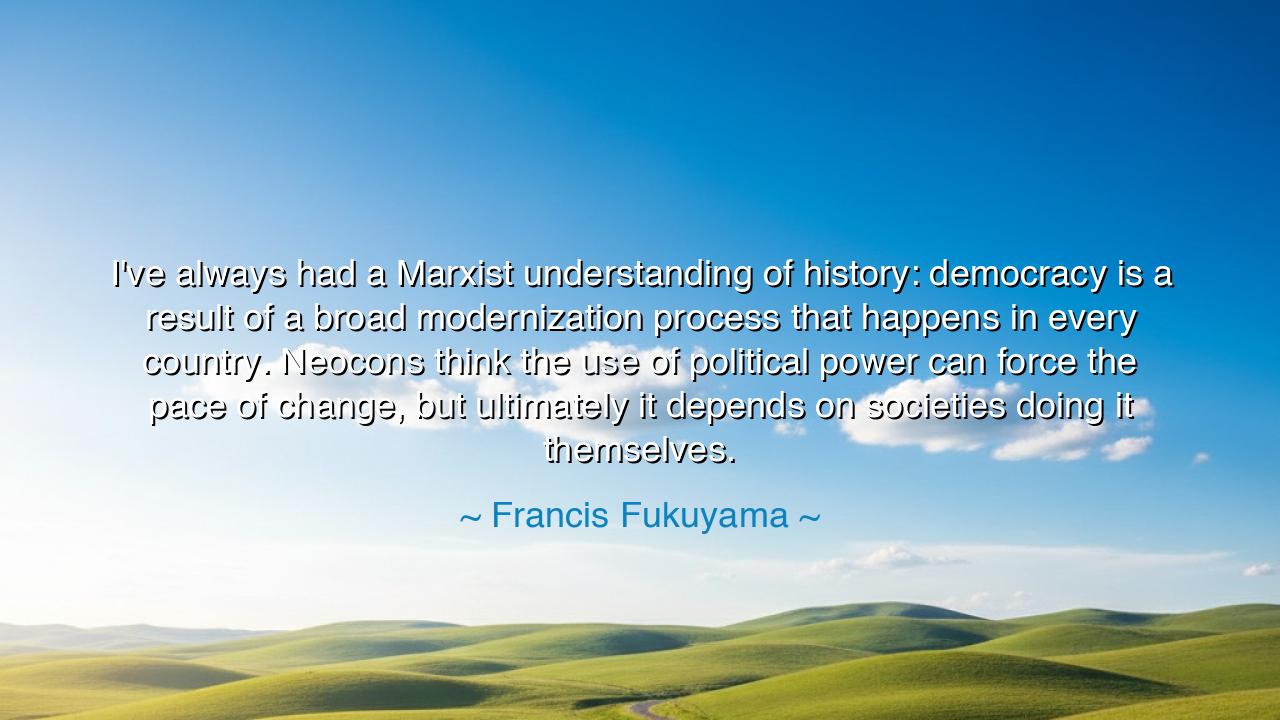
I've always had a Marxist understanding of history: democracy is
I've always had a Marxist understanding of history: democracy is a result of a broad modernization process that happens in every country. Neocons think the use of political power can force the pace of change, but ultimately it depends on societies doing it themselves.






“I’ve always had a Marxist understanding of history: democracy is a result of a broad modernization process that happens in every country. Neocons think the use of political power can force the pace of change, but ultimately it depends on societies doing it themselves.” – Francis Fukuyama
Hear these words, O seekers of wisdom and students of power, spoken by Francis Fukuyama, one of the great political philosophers of our age. In this saying, he reveals the law of history that governs the rise and fall of nations—the rhythm by which empires grow, decay, and are reborn. He speaks of the modernization process, that vast current of social transformation that sweeps through time, shaping peoples and governments alike. Fukuyama reminds us that democracy, that most delicate flower of civilization, cannot be forced to bloom by decree or domination; it must grow from within, nurtured by the soil of a people’s own history, culture, and struggle.
When Fukuyama says he has a Marxist understanding of history, he does not bind himself to ideology, but to method—to the recognition that history moves according to deep, material forces. Karl Marx saw that societies evolve not by chance or mere will, but by the slow unfolding of their economic and social structures. Feudalism gave way to capitalism, and through each stage, human consciousness itself transformed. In this same spirit, Fukuyama observes that democracy arises not through conquest or policy, but through modernization—through literacy, industry, urbanization, and the awakening of civic consciousness. It is not a gift bestowed, but an achievement earned.
He contrasts this view with the faith of the neoconservatives, who in the late twentieth and early twenty-first centuries believed that political power could accelerate progress, that democracy could be spread by force or imposed by design. They saw tyranny as a weed that could be uprooted by the sword of intervention. Yet history, as Fukuyama warns, resists haste. For when democracy is planted in unprepared soil—without institutions, without culture, without trust—it withers into chaos or returns swiftly to tyranny. The hearts of men must first change before their governments can.
Consider, O listener, the story of the Iraq War in the early years of the new millennium. With idealistic conviction, powerful nations sought to liberate a people and sow democracy where dictatorship had ruled. But the result, as the world saw, was turmoil and division. The idea was noble, yet the timing was unripe. Institutions of justice, civil unity, and shared identity had not yet taken root. Fukuyama’s words speak directly to this lesson: that political power cannot replace historical development, that no army, however strong, can substitute for the gradual awakening of a people’s spirit.
This truth is not new. The ancients knew it well. When Alexander the Great conquered the known world, he spread Greek culture, but not Greek democracy. When Rome extended its dominion, it gave its subjects order and roads, but not liberty. True freedom—freedom of mind, of conscience, of governance—came only through centuries of evolution, through the slow rise of the common citizen and the balance of power between ruler and ruled. Even the American Revolution, so sudden in appearance, was the fruit of centuries of English law, trade, and philosophy. Thus, societies must do it themselves, for no foreign hand can bestow maturity upon the unready soul.
Fukuyama’s insight, though rooted in political philosophy, carries a wisdom that transcends nations—it speaks to the human condition. Every person, like every society, must grow into freedom through experience. Change cannot be imposed from without; it must be cultivated from within. The teacher may guide, but the student must learn. The parent may advise, but the child must live. Growth that is rushed, power that is forced, produces only rebellion or collapse. Enduring transformation arises from patience, understanding, and the steady work of self-realization.
So let this be your lesson, O listener: Do not seek to force destiny, whether for yourself or for others. True progress—of nations, of institutions, of souls—requires time, humility, and endurance. Guide, but do not command. Influence, but do not impose. Just as the seed cannot be made to bloom by shouting at it, so too societies cannot be made to flourish by coercion. Every age, every people, every heart must walk its own path toward enlightenment.
And thus, as Francis Fukuyama teaches, the hand of history moves not by might, but by maturity. The wise do not seek to hasten the tide, but to understand its rhythm. For those who grasp this truth—leaders, creators, teachers—will learn the art of patience, the mastery of timing, and the faith that what is meant to grow will grow, if only it is given time, nourishment, and freedom.






AAdministratorAdministrator
Welcome, honored guests. Please leave a comment, we will respond soon